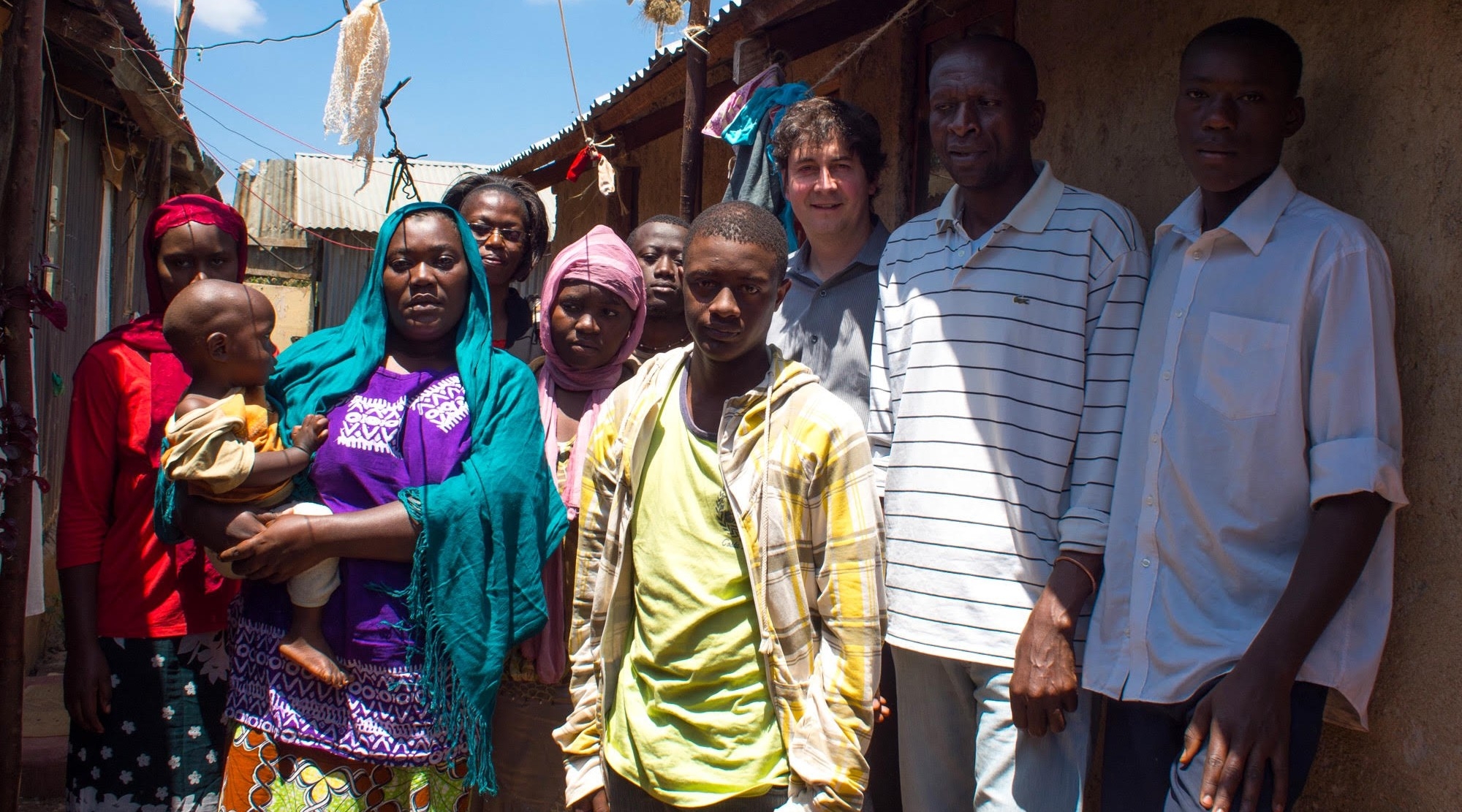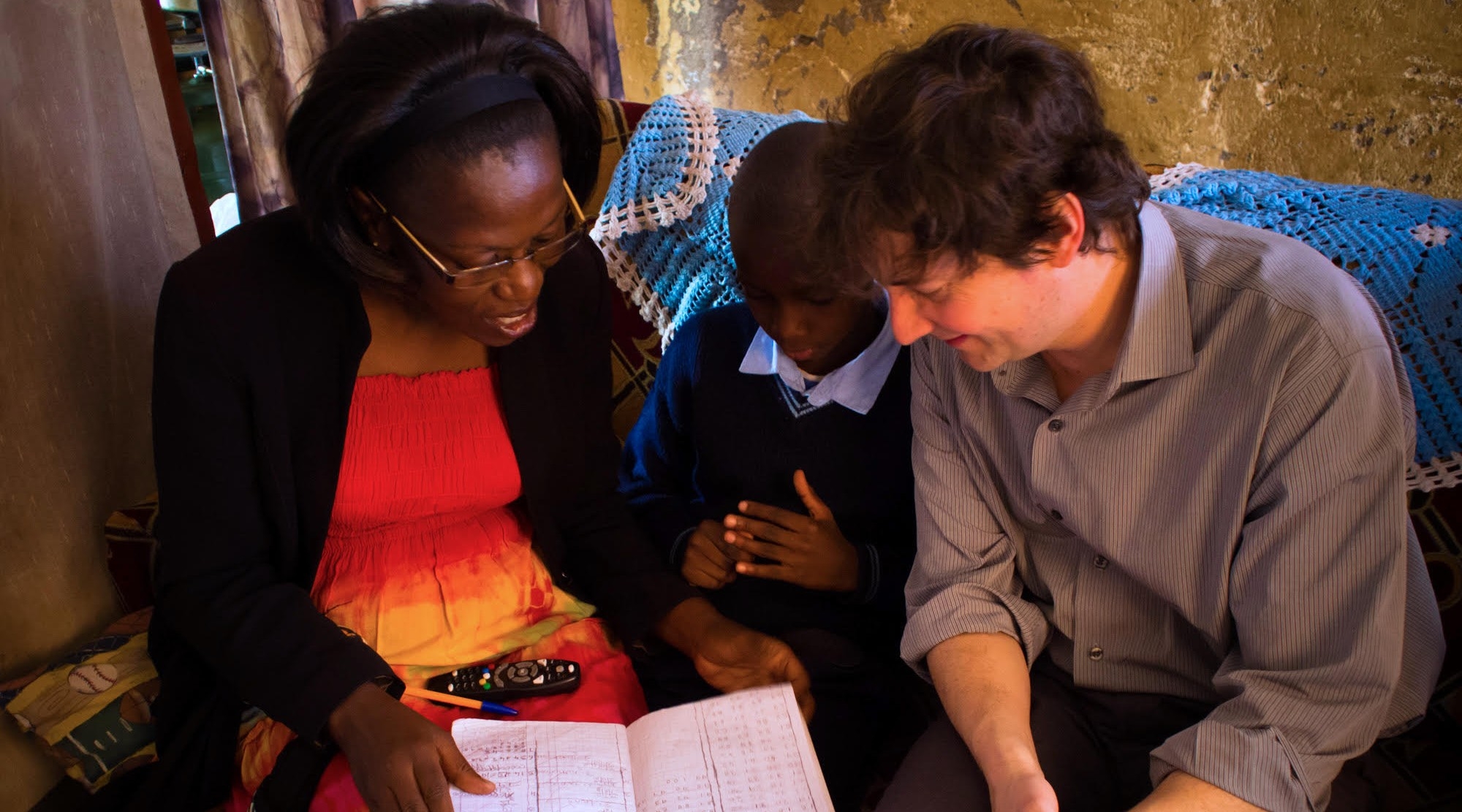Sasha Chanoff recalls the day he was forced to make one of the most painful decisions of his life.
It was 2000, only six years after the genocide in Rwanda, and Chanoff — a Finnish-born Jew working with the International Organization for Migration — was sent to neighboring Congo on a risky mission: drive to a safe haven about an hour from Kinshasa, the capital, and gather 112 ethnic Tutsi refugees onto the last available evacuation flight out of the country.
The job was especially dangerous because Laurent Kabila, who recently had taken power in Congo, had declared that all Tutsis were enemies to be hunted down and exterminated.
“My boss gave me a list with their names on it and said, ‘No matter what you do, don’t try to include anybody else on your list. If you do, no one will get out,’” Chanoff recalled.
But upon arrival, he and a colleague were introduced to an additional 32 widows and orphans, all of whom appeared emaciated and traumatized by what they had been through.
“My colleague leaned over to a child holding a little doll, and all of a sudden, the doll’s eyes opened. It was actually a 9-month-old infant,” he said. “It was clear to us at that moment that if we didn’t include them, some—if not all—would lose their lives.”
Thinking quickly, Chanoff and his colleague registered all the small children as being under the age of 2 so they could sit on the laps of other passengers, opening up aircraft space. Traveling by bus under armed escort, the group arrived at the Kinshasa airport and waited as Congolese immigration officials checked their documents.
It appeared that the officials would stop them from boarding the plane, but they finally were allowed to take off for a refugee camp in Cameroon, and from there to the United States.
“That day, my eyes were opened to people who are overlooked and forgotten,” Chanoff said. “Again and again in many places where I worked, I saw people who didn’t have access to the things they needed to survive.”
It’s an experience that defines the essence of RefugePoint, the nonprofit Chanoff established 20 years ago in Nairobi, Kenya. Originally designed to provide lifesaving care to refugees who fall through the cracks of assistance there, RefugePoint has grown into a global organization that has helped more than 170,000 refugees access resettlement, self-reliance opportunities and other pathways to safety.
At a time of rising populism and increasing opposition worldwide to immigration from countries wracked by poverty and civil war, Chanoff says his work is more urgent than ever.
“The number of refugees worldwide could rise significantly with climate change, which is often a trigger to crisis. Many of them are fleeing war, violence, and persecution,” Chanoff said, citing estimates that 1 billion people may be forcibly displaced by 2050 if current trends continue.

Sasha Chanoff, third from right, with Congolese war refugees seeking safety in Nairobi, Kenya, in 2019. (Courtesy of RefugePoint)
Though Chanoff, 54, was born in Finland, he speaks English, Finnish, French, German and Swahili. The descendant of Jewish great-grandparents who escaped pogroms in Russia, Chanoff grew up in the Boston area, earning degrees from Wesleyan University and Tufts University. After college, he worked for Jewish Vocational Service in Boston, helping to resettle newly arrived refugees from war-torn countries such as Bosnia, Iraq and Somalia.
“When I started working with refugees, I was viscerally struck by the idea that if I could play a small role in helping people rebuild their lives here in the U.S., then it was the most important thing I could do in my own life,” he said. “It was my own personal, very Jewish experience that led to this calling.”
Chanoff added, “My great-grandmother arrived as a refugee and raised four children on her own. And my grandfather managed to rise out of poverty and become a successful business leader.”
In 2010, Chanoff won The Charles Bronfman Prize, a $100,000 award given annually to a Jewish humanitarian under 50 whose innovative work has significantly improved the world. Ellen Bronfman Hauptman and Stephen Bronfman founded the Prize in 2004 along with their spouses, Andrew Hauptman and Claudine Blondin Bronfman, to honor their father on his 70th birthday. Chanoff said The Prize marked a turning point for his organization.
“All of a sudden, it was like we were finally on the global stage. People saw the lifesaving work we do and wanted to help us,” he said. “It dramatically expanded RefugePoint’s ability to reach people.”
With main offices in Boston, Geneva, and Nairobi, RefugePoint has 175 employees and has worked in 73 countries. The vision of the organization has clearly inspired people: The annual budget is $16.4 million, a significant portion of which comes from individual donors.
“When people see the unique role we play—like reuniting a mother and her child, for example, or building a new labor mobility program to match refugee skills with companies that can’t find employees—they want to help,” Chanoff said.
The organization is charting a new course for humanitarian action by establishing new legal migration programs, as well as programs that help refugees to become self-reliant in the countries to which they’ve fled.
“We have really good relationships with the UN Refugee Agency, governments, and organizations,” Chanoff said. “These collaborations are critical to our success.”
There is a clear moral component of the work, but Chanoff also highlighted the economic contributions that refugees make: filling jobs and, according to one study, contributing $124 billion more in U.S. taxes than they consume in services over the course of 15 years.
Chanoff wrote the book “From Crisis to Calling: Finding Your Moral Center in the Toughest Decisions” and long has advocated for establishing lasting solutions for refugees so they can lead productive lives and contribute to their new communities.
With a new president in the White House who has expressed anti-immigrant sentiments and threatened to deport millions of people, Chanoff said the situation is likely to get worse for those seeking refuge around the world.
RefugePoint is poised to fill the gaps that may emerge if the United States limits opportunities for refugees to enter the country. The group works with many other countries that have legal resettlement programs, including Canada, Australia and New Zealand.
“Forced migration will be a headline issue for the rest of our lives,” Chanoff said. “We must find new and creative ways to address refugees’ search for safety and align these with the needs of countries that welcome them.”
JTA has documented Jewish history in real-time for over a century. Keep our journalism strong by joining us in supporting independent, award-winning reporting.
This story was sponsored by and produced in partnership with The Charles Bronfman Prize, an annual prize presented to a humanitarian whose innovative work fueled by their Jewish values has significantly improved the world. This article was produced by JTA's native content team.
More from The Charles Bronfman Prize





